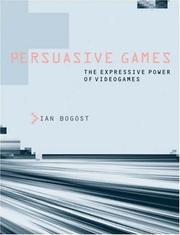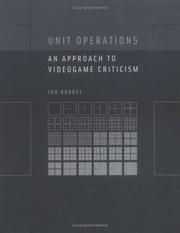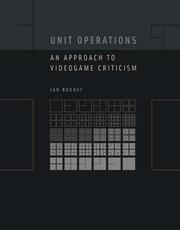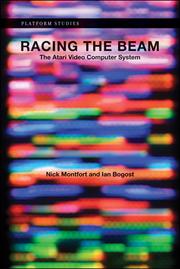| Listing 1 - 10 of 11 | << page >> |
Sort by
|
Book
ISBN: 1282978373 9786612978371 0262289229 9780262289221 9780262289085 0262289083 9781282978379 9780262014878 0262014874 6612978376 Year: 2010 Publisher: Cambridge : MIT Press,
Abstract | Keywords | Export | Availability | Bookmark
 Loading...
Loading...Choose an application
- Reference Manager
- EndNote
- RefWorks (Direct export to RefWorks)
Journalism has embraced digital media in its struggle to survive. But most online journalism just translates existing practices to the Web: stories are written and edited as they are for print; video and audio features are produced as they would be for television and radio. The authors of Newsgames propose a new way of doing good journalism: videogames. Videogames are native to computers rather than a digitized form of prior media. Games simulate how things work by constructing interactive models; journalism as game involves more than just revisiting old forms of news production. The book describes newsgames that can persuade, inform, and titillate; make information interactive; re-create a historical event; put news content into a puzzle; teach journalism; and build a community. Wired magazine's game Cutthroat Capitalism, for example, explains the economics of Somali piracy by putting the player in command of a pirate ship, offering choices for hostage negotiation strategies. And Powerful Robot's game September 12th offers a model for a short, quickly produced, and widely distributed editorial newsgame. Videogames do not offer a panacea for the ills of contemporary news organizations. But if the industry embraces them as a viable method of doing journalism--not just an occasional treat for online readers--newsgames can make a valuable contribution.
Video games. --- Online journalism. --- Interactive multimedia. --- Hypermedia systems --- Interactive media --- Electronic journalism --- Internet journalism --- Television games --- Videogames --- Computer software --- Journalism --- Digital media --- Electronic games --- INFORMATION SCIENCE/Communications & Telecommunications --- GAME STUDIES/Games & Culture --- SOCIAL SCIENCES/Media Studies --- Jeux vidéo --- Journalisme en ligne --- Multimédias interactifs --- Interactive multimedia --- Online journalism --- Video games --- #SBIB:309H1010 --- #SBIB:309H1713 --- #SBIB:309H17 --- Organisatorische aspecten van de media: algemene werken (incl. journalistiek) --- Mediatechnologie: nieuwe toepassingen (abonnee-televisie, electronic mail, desk top publishing, virtuele realiteit...) --- Computer- en videogames --- Computer games --- Internet games --- Games
Book
ISBN: 9780816676460 9780816676477 0816676461 081667647X Year: 2011 Volume: 38 Publisher: Minneapolis University of Minnesota Press
Abstract | Keywords | Export | Availability | Bookmark
 Loading...
Loading...Choose an application
- Reference Manager
- EndNote
- RefWorks (Direct export to RefWorks)
"In recent years, computer games have moved from the margins of popular culture to its center. This book explores the many ways computer games are used today: documenting important historical and cultural events, educating both children and adults; promoting commercial products; and serving as platforms for art, pornography, exercise, relaxation, pranks, and politics." --Publisher description.
Video games --- Social aspects --- 527 --- Games --- gamedesign --- simulaties --- video games --- informatica - specifieke toepassingen --- Jeu vidéo --- Jeu --- Art vidéo --- Informatique appliquée --- Informatique graphique --- Video games - Social aspects

ISBN: 1282100785 9786612100789 0262268914 1429480289 9780262268912 9781429480284 0262026147 9780262026147 6612100788 9780262514880 0262261944 0262514885 Year: 2007 Publisher: Cambridge ; London : The MIT Press,
Abstract | Keywords | Export | Availability | Bookmark
 Loading...
Loading...Choose an application
- Reference Manager
- EndNote
- RefWorks (Direct export to RefWorks)
An exploration of the way videogames mount arguments and make expressive statements about the world that analyzes their unique persuasive power in terms of their computational properties.Videogames are an expressive medium, and a persuasive medium; they represent how real and imagined systems work, and they invite players to interact with those systems and form judgments about them. In this innovative analysis, Ian Bogost examines the way videogames mount arguments and influence players. Drawing on the 2,500-year history of rhetoric, the study of persuasive expression, Bogost analyzes rhetoric's unique function in software in general and videogames in particular. The field of media studies already analyzes visual rhetoric, the art of using imagery and visual representation persuasively. Bogost argues that videogames, thanks to their basic representational mode of procedurality (rule-based representations and interactions), open a new domain for persuasion; they realize a new form of rhetoric. Bogost calls this new form "procedural rhetoric," a type of rhetoric tied to the core affordances of computers: running processes and executing rule-based symbolic manipulation. He argues further that videogames have a unique persuasive power that goes beyond other forms of computational persuasion. Not only can videogames support existing social and cultural positions, but they can also disrupt and change these positions themselves, leading to potentially significant long-term social change. Bogost looks at three areas in which videogame persuasion has already taken form and shows considerable potential: politics, advertising, and learning.
Video games --- Persuasion (Rhetoric) --- Social aspects. --- Rhetoric --- Forensics (Public speaking) --- Oratory --- GAME STUDIES/General --- GAME STUDIES/Game History --- SOCIAL SCIENCES/Media Studies --- Sociology of culture --- Mass communications --- Computer. Automation --- Persuasion (Rhetoric). --- Persuasion (rhétorique) --- Jeux vidéo --- Publicité intégrée dans les jeux vidéo. --- Médias en éducation. --- Aspect politique. --- Aspect social. --- Social aspects --- Jeux vidéo --- Argumentation --- Aspect social --- 527 --- Games --- video games --- informatica - specifieke toepassingen --- Jeu vidéo --- Jeu --- Art vidéo --- Informatique appliquée --- Informatique graphique --- Video games - Social aspects --- #SBIB:309H17 --- #SBIB:309H402 --- Computer- en videogames --- Media en publiekgroepen: gebruik van de boodschap, effecten van de media, --- Persuasion (rhétorique) --- Publicité intégrée dans les jeux vidéo. --- Médias en éducation.

ISBN: 026202599X 9780262268929 0262268922 1423772504 9781423772507 9780262025997 1282097792 9786612097799 0262261898 Year: 2006 Publisher: Cambridge, Mass. : MIT Press,
Abstract | Keywords | Export | Availability | Bookmark
 Loading...
Loading...Choose an application
- Reference Manager
- EndNote
- RefWorks (Direct export to RefWorks)
In Unit Operations, Ian Bogost argues that similar principles underlie both literary theory and computation, proposing a literary-technical theory that can be used to analyze particular videogames. Moreover, this approach can be applied beyond videogames: Bogost suggests that any medium--from videogames to poetry, literature, cinema, or art--can be read as a configurative system of discrete, interlocking units of meaning, and he illustrates this method of analysis with examples from all these fields. The marriage of literary theory and information technology, he argues, will help humanists take technology more seriously and hep technologists better understand software and videogames as cultural artifacts. This approach is especially useful for the comparative analysis of digital and nondigital artifacts and allows scholars from other fields who are interested in studying videogames to avoid the esoteric isolation of "game studies."The richness of Bogost's comparative approach can be seen in his discussions of works by such philosophers and theorists as Plato, Badiou, Zizek, and McLuhan, and in his analysis of numerous videogames including Pong, Half-Life, and Star Wars Galaxies. Bogost draws on object technology and complex adaptive systems theory for his method of unit analysis, underscoring the configurative aspects of a wide variety of human processes. His extended analysis of freedom in large virtual spaces examines Grand Theft Auto 3, The Legend of Zelda, Flaubert's Madame Bovary, and Joyce's Ulysses. In Unit Operations, Bogost not only offers a new methodology for videogame criticism but argues for the possibility of real collaboration between the humanities and information technology.
Computer games --- Design. --- Philosophy. --- Sociological aspects. --- Application software --- Electronic games --- Internet games --- Television games --- Videogames --- Games --- Design --- Video games --- Social aspects. --- GAME STUDIES/General --- DIGITAL HUMANITIES & NEW MEDIA/New Media Theory --- SOCIAL SCIENCES/Media Studies
Book
ISBN: 9780465051724 0465051723 0465096506 Year: 2016 Publisher: New York Basic Books
Abstract | Keywords | Export | Availability | Bookmark
 Loading...
Loading...Choose an application
- Reference Manager
- EndNote
- RefWorks (Direct export to RefWorks)
"Life is boring: filled with meetings and traffic, errands and emails. Nothing we'd ever call fun. But what if we've gotten fun wrong? In Play Anything, visionary game designer and philosopher Ian Bogost shows how we can overcome our daily anxiety; transforming the boring, ordinary world around us into one of endless, playful possibilities. The key to this playful mindset lies in discovering the secret truth of fun and games. Play Anything, reveals that games appeal to us not because they are fun, but because they set limitations. Soccer wouldn't be soccer if it wasn't composed of two teams of eleven players using only their feet, heads, and torsos to get a ball into a goal; Tetris wouldn't be Tetris without falling pieces in characteristic shapes. Such rules seem needless, arbitrary, and difficult. Yet it is the limitations that make games enjoyable, just like it's the hard things in life that give it meaning. Play is what happens when we accept these limitations, narrow our focus, and, consequently, have fun. Which is also how to live a good life. Manipulating a soccer ball into a goal is no different than treating ordinary circumstances- like grocery shopping, lawn mowing, and making PowerPoints-as sources for meaning and joy. We can "play anything" by filling our days with attention and discipline, devotion and love for the world as it really is, beyond our desires and fears. Ranging from Internet culture to moral philosophy, ancient poetry to modern consumerism, Bogost shows us how today's chaotic world can only be tamed-and enjoyed-when we first impose boundaries on ourselves"-- "The gold standard of our culture is 'fun.' Companies want their offices to feel more playful, schools want learning to be entertaining, programmers want their products to feel as intuitive and addictive as playing Tetris or AngryBirds. Trying to make life like playing a game sounds like a good idea--who doesn't want to have fun while working or commuting, parenting or cleaning?--but what's often overlooked in the rush to make everything 'fun' is that games are hard. Playing a sport requires concentration, repetition, and physical pain; playing a musical instrument demands shockingly boring practice and patience; even playing video games requires hours and hours of study, determination, and drive. Making our ideas about 'play' sound a whole lot like 'work.' Where's the fun in that? In Play Anything, Ian Bogost--the Ivan Allen College Distinguished Chair in Media Studies and Professor of Interactive Computing at the Georgia Institute of Technology--shows that our common understanding of games--that they are always fun, and always juvenile--is dead wrong. And that that's a good thing, both for how we play and how we conduct our days"--
Creative ability --- Popular culture --- Social aspects --- #SBIB:309H040 --- #SBIB:1H30 --- #SBIB:316.7C124 --- Culture, Popular --- Mass culture --- Pop culture --- Popular arts --- Communication --- Intellectual life --- Mass society --- Recreation --- Culture --- Creativeness --- Creativity --- Ability --- Creation (Literary, artistic, etc.) --- Populaire cultuur algemeen --- Filosofie van de mens, wijsgerige antropologie --- Cultuursociologie: gebruiken, zeden en gewoonten --- Popular culture - Social aspects
Book
ISBN: 0816699127 0816699119 9780816699124 9780816699117 Year: 2015 Publisher: Minneapolis (Minn.): University of Minnesota press,
Abstract | Keywords | Export | Availability | Bookmark
 Loading...
Loading...Choose an application
- Reference Manager
- EndNote
- RefWorks (Direct export to RefWorks)
Delving into popular, familiar games like Flappy Birds, Mirror's Edge, Mario Kart, Scribblenauts, Ms. Pac-Man, FarmVille, Candy Crush Saga, Bully, Medal of Honor, Madden NFL, and more, Ian Bogost posits that videogames are as much like appliances as they are like art and media. We don't watch or read games like we do films and novels and paintings, nor do we perform them like we might dance or play football or Frisbee. Rather, we do something in between with games. Games are devices we operate, so game critique is both serious cultural currency and self-parody. Nothing that the term game criticism once struck him as preposterous, Bogost observes that the idea, taken too seriously, risks balkanizing games writing from the rest of culture, severing it from the "rivers and fields" that sustain it. As essential as it is, he calls for its pursuit to unfold in this spirit: "God save us from a future of game critics, gnawing on scraps like the zombies that fester in our objects of study."

ISBN: 9780262524872 Year: 2008 Publisher: Cambridge, MA : The MIT Press,
Abstract | Keywords | Export | Availability | Bookmark
 Loading...
Loading...Choose an application
- Reference Manager
- EndNote
- RefWorks (Direct export to RefWorks)
Book
ISBN: 9780816678976 9780816678983 Year: 2012 Publisher: Minneapolis University of Minnesota press
Abstract | Keywords | Export | Availability | Bookmark
 Loading...
Loading...Choose an application
- Reference Manager
- EndNote
- RefWorks (Direct export to RefWorks)
Metaphysics --- Ontology --- Phenomenology

ISBN: 026225493X 9780262254939 9780262012577 9780262261524 0262261529 026201257X Year: 2009 Publisher: Cambridge, Mass. : MIT Press,
Abstract | Keywords | Export | Availability | Bookmark
 Loading...
Loading...Choose an application
- Reference Manager
- EndNote
- RefWorks (Direct export to RefWorks)
A study of the relationship between platform and creative expression in the Atari VCS.The Atari Video Computer System dominated the home video game market so completely that “Atari” became the generic term for a video game console. The Atari VCS was affordable and offered the flexibility of changeable cartridges. Nearly a thousand of these were created, the most significant of which established new techniques, mechanics, and even entire genres. This book offers a detailed and accessible study of this influential video game console from both computational and cultural perspectives.Studies of digital media have rarely investigated platforms—the systems underlying computing. This book (the first in a series of Platform Studies) does so, developing a critical approach that examines the relationship between platforms and creative expression. Nick Montfort and Ian Bogost discuss the Atari VCS itself and examine in detail six game cartridges: Combat, Adventure, Pac-Man, Yars' Revenge, Pitfall!, and Star Wars: The Empire Strikes Back. They describe the technical constraints and affordances of the system and track developments in programming, gameplay, interface, and aesthetics. Adventure, for example, was the first game to represent a virtual space larger than the screen (anticipating the boundless virtual spaces of such later games as World of Warcraft and Grand Theft Auto), by allowing the player to walk off one side into another space; and Star Wars: The Empire Strikes Back was an early instance of interaction between media properties and video games. Montfort and Bogost show that the Atari VCS—often considered merely a retro fetish object—is an essential part of the history of video games.
Atari 2600 (Video game console) --- Computer games --- Video games --- Programming. --- Equipment and supplies. --- History. --- Television games --- Videogames --- Computer game programming --- Game programming (Computer games) --- Atari CX2600 (Video game console) --- Atari VCS (Video game console) --- Atari video computer system --- VCS (Video game console) --- Electronic games --- Computer programming --- Atari computer --- Equipment and supplies --- GAME STUDIES/General --- DIGITAL HUMANITIES & NEW MEDIA/General --- SOCIAL SCIENCES/Media Studies --- Jeux vidéo --- Atari (ordinateurs) --- Internet games --- Games --- Programming
Book
ISBN: 0262518074 9780262518079 Year: 2012 Publisher: Cambridgen: MIT Press,
Abstract | Keywords | Export | Availability | Bookmark
 Loading...
Loading...Choose an application
- Reference Manager
- EndNote
- RefWorks (Direct export to RefWorks)
"Journalism has embraced digital media in its struggle to survive. But most online journalism just translates existing practices to the Web: stories are written and edited as they are for print; video and audio features are produced as they would be for television and radio. The authors of "Newsgames" propose a new way of doing good journalism: videogames. Videogames are native to computers rather than a digitized form of prior media. Games simulate how things work by constructing interacting models; journalism as game involves more than just revisiting old forms of news production. Wired magazine's game "Cutthroat Capitalism," for example, explains the economics of Somali piracy by putting the player in command of a pirate ship, offering choices for hostage negotiation strategies. And Powerful Robot's game "September 12th" offers a model for a short, quickly produced, and widely distributed editorial newsgame. Videogames do not offer a panacea for the ills of contemporary news organizations. But if the industry embraces them as a viable method of doing journalism - not just an occasional treat for online readers - newsgames can make a valuable contribution."--Back cover.
Jeu vidéo --- Jeu --- Art vidéo --- Informatique appliquée --- Informatique graphique --- Video games --- Online journalism --- Interactive multimedia
| Listing 1 - 10 of 11 | << page >> |
Sort by
|

 Search
Search Feedback
Feedback About
About Help
Help News
News